Water Conservation: 12 Tips for a Water Wise Garden
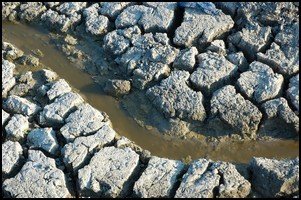 Picture Courtesy Serghei Starus - Dreamstime.com
Picture Courtesy Serghei Starus - Dreamstime.com
Water conservation is important as water is a limited resource. With a growing population and the indifference at large for keeping our water systems clean and healthy, water will soon become a scarce commodity. Therefore, as gardeners we should try to conserve water as much as we can, in order to do our bit for the planet. Saving water is also good practice if you live in an area that is often plagued by drought or a low-rainfall.
WATER CONSERVATION TIP 1: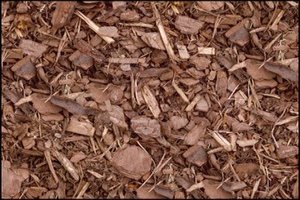
USE MULCH - Mulching is probably your most important way of saving water in your garden. It increases the soil's moisture levels, reduces evaporation and stops a thin crust from forming on the top of your soil that can actually prevent moisture penetrating.
There are various mulches that can be used from bark, sugar cane leaves, lucerne, leaves, pea straw, compost etc. However, some are more attractive than others, and if you want your garden to look good, stay away from the sugar cane leaves, unless you put them through a chipper to chop up the leaves really fine, then they don't make the garden look too untidy, and it isn't long before they start changing colour from the sun, and break down to blend more into your garden.
Whatever you choose to use in the end it should retain moisture, retard weed growth, be free of weed seed, create an attractive neutral surface, improve the soil as it decays, and be inexpensive to acquire and maintain.
However, make sure that when you apply the mulch that you do so that the water and rain will still get to your plants, and if you are using grass clippings use them sparingly as they will also act as a dense matting which will prevent the moisture from getting to your plants if applied too thickly.
WATER CONSERVATION TIP 2:PLANT NATIVES - Planting cottage garden plants in an area that receives very little rainfall is as daft as planting cacti in high-rainfall areas. You will have an uphill battle with both types of gardens. Rather look at your area and plant trees and plants that are native to that area. First of all they will grow better with less fuss than exotic plants, and secondly, they will accept the rainfall patterns of the area and even adjust to drought, far better than your exotics.
I am not saying that native plants and trees are drought- resistant, but what I am saying is that you will loose these far later than your exotics and you will not have to water them as often.
WATER CONSERVATION TIP 3: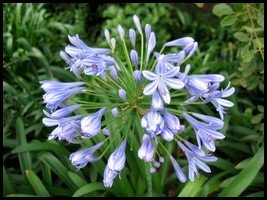
PLANT HARDY PLANTS - Plants that have a high oil content, have thick, fleshy or hairy leaves and that have a large roots will also need less watering than plants that don't have these qualities. These are plants that don't do well in the shade, and so will need to be in the sun to flourish.
Plants such as the African Lily or Agapanthus as it is commonly known, acanthus, clivias, dahlias, cannas, red hot pokers and day lilies will all do well in the heat with little water needed if you live in places like South Africa, some parts of Australia, California etc. They all share the same sort of climate.
WATER CONSERVATION TIP 4:PREPARE THE GROUND - Ground preparation is essential for conserving water. Make sure that the holes have been dug large enough for your plants and filled with lots of compost and manure. Dig your planting hole as deep as the root ball and three times as wide. This extra space on the sides will encourage better root growth. In addition, you can also install a length of black poly-pipe beside the roots, so that it extends marginally above ground level to allow you easy access before you fill in the hole. This will enable you to apply water to the roots of shrubs and plants, where it is needed and will prevent water run-off.
WATER CONSERVATION TIP 5: 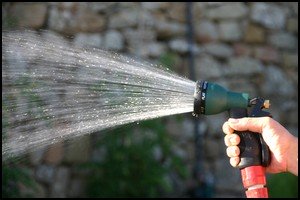
USE TRIGGER NOZZLE SPRAY GUNS - These are great for watering plants where you don't waste water unnecessarily. Make sure that you water the base of the plants too, not just the leaves. It is also better to deep water once every other day or so, rather than surface watering every day.
WATER CONSERVATION TIP 6:DRIP IRRIGATION SYSTEMS - Drip irrigation systems help reduce water use and meet the needs of plants. With these methods, very small amounts of water are supplied to the base of the plants. Since the water is applied directly to the soil, rather than onto the plant, evaporation from leaf surfaces is reduced. The water is also placed where it will do the most good, rather than sprayed over the entire garden. However, remember that from time to time a good hosing will get rid of spider mites and aphids, and also remove the dust from the leaves, which you drip irrigation can't do.
WATER CONSERVATION TIP 7:TIME YOUR WATERING - Watering should be done either early morning, or evening to reduce the chance of evaporation. Also never water on a windy day as the wind will take away the water quicker than the plants can absorb it. If you are concerned about powdery mildew forming on your vegetables and plants, then only water in the early morning.
WATER CONSERVATION TIP 8: WATER TO THE DEPTH OF THE ROOTS - There is no point in giving shallow rooted plants like lettuce and strawberries loads of water, because only a fraction of that water will be used by the plant, the rest will eventually be lost in evaporation. Therefore, only water to the depth of the root system of your plants.
WATER CONSERVATION TIP 9:REDUCE THE SIZE OF YOUR LAWN - Caring for your lawn is a full time job, and if you are serious about your lawn it is a huge water guzzler. To conserve water here don't cut your grass shorter than 2 cm to give the grass enough leaf to protect itself without getting burnt, and aerate the soil to encourage the grass to develop a deeper root system to go deeper. Only water your lawn when it shows signs of stress, and do so within 48 hours of seeing a loss of colour.
WATER CONSERVATION TIP 10:WEEDS - These are in competition with your plants and flowers for water. Therefore, by keeping on top of weeding, your plants will have more water.
WATER CONSERVATION TIP 11:INCREASE SHADE - By creating shade in your garden you are protecting your plants from an overdose of sun, and also helping keep the moisture in the soil for longer. Shade can be created by planting trees that form canopies, or building man-made structures like pergolas with a creeper grown to cover it.
WATER CONSERVATION TIP 12: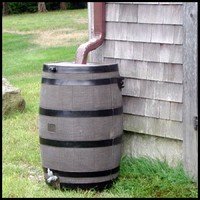
rain barrels and water tanks - When rains fall, think of the waste of water that disappears into the ground and soon evaporates. By harnessing this water in the rain barrel from the water that comes off your roof and then placed in a water tank can save this precious rainwater from just running away. You will be surprised how quickly your tank will fill up, and how much of your garden you can water with this free source.
By conserving water in your garden not only will you be helping the planet but you will also be creating a water wise garden that will help cut your water bill! Now that should be a motivating factor, if nothing else, for saving water in your garden!
Go from Water Conservation back to Green Living
Go to Living Off Grid
Return to Countryfarm Lifestyles